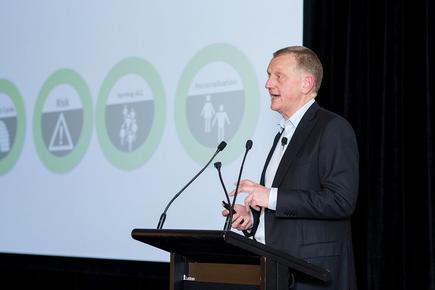CIO upfront: What does it mean to become a digital nation, and why should we care?
- 14 March, 2018 07:00

Did you know New Zealand is a world leader in harnessing the benefits of digital technologies? The latest findings in the Digital Evolution Index (DEI) from Tufts University’s Fletcher School showed that, out of 60 countries assessed, New Zealand was one of only three “stand-out” nations.
This is something that should get every New Zealander excited. Embracing digital technology is fundamental to New Zealand’s future competitive advantage and place in the global economy, as well as the strength of our political institutions and democratic processes, and our overall social and economic wellbeing.
Our standing in the DEI is no accident. It is thanks to decisions and initiatives of successive governments over many years. These include introduction of New Zealand’s first e-Government strategy in 2001, changes to telecommunications regulations and public investment in broadband, enactment of legislation enabling e-commerce, the digitisation of our public services, introduction of digital technologies into the education system, improvements to national cybersecurity and support for innovation. The private sector, NGOs, communities and ordinary New Zealanders have been equally busy in driving our digital evolution.
It’s encouraging to see our new government now picking up the baton and committing to things like creating the position of a national Chief Technology Officer, maintaining emphasis on investment in our digital infrastructure, and ensuring the market for supply of digital technologies is open and competitive.

While it’s truly heartening to see New Zealand top the list of digital nations, we can’t rest there.
Our government is working to ensure New Zealanders’ digital rights are clearly defined and protected, and participation in our future digital economy and society is as inclusive as possible. It is also working to maintain the public’s trust in the digital environment and its security, something that is increasingly important. Yet, as the digitalisation of our lives accelerates, there is much more to be done.
For example, we need to fundamentally digitally transform our education system, from design of the curriculum through to delivery in the classroom and beyond, and in the administration of schools. We should all hope that this question is central to the review of Tomorrow’s Schools just announced by the Minister of Education.
Through our work with governments around the world, we see how the latest generation of information technologies – especially cloud services, big data and analytics, AI and machine learning, robotics and the Internet of Things – are affecting all nations. We can see why New Zealand deserves to be recognised as a stand-out digital nation and we want to share that story with the world.
Recently, we sponsored the Digital Nations 2030 Summit, where the Government Chief Digital Officer, Colin MacDonald talked about boosting innovation in the public sector and making technology accessible for everyone. We’ve been working with Colin’s team and the Fletcher School to investigate how technology could improve our society at a national level. The first outcome from that is “Building “Smart Societies” – A Blueprint for Action”, published by the Fletcher School late last year.

A smart society is one where digital technology is harnessed to improve the well-being of people, the strength of the economy, and the effectiveness of institutions. Our report investigates how well each of the Digital 7 (D7) nations fares in these categories, with “dashboards” of progress that help countries assess where they stand today and what they need to do next.
Importantly, the Smart Societies model is not driven by a technology-first view of the world. It focuses on where we want our society to be first, then considers how technology could help us get there. While none of the D7 nations has reached its own ambitious goals yet, they all see that by working together, learning, and supporting one another, they can all achieve more. Digitalisation creates opportunities for governments to deliver better services, meet a wide range of policy objectives and position their nations for success in the future. We are committed to contributing to realising that goal wherever we can.
For New Zealand, the model shows us three things. There’s a clear need to focus on our economy – particularly on fostering entrepreneurship and innovation. Our public institutions are strong, but with room for further improvement, and while we enjoy a great quality of life and well-being, we could benefit from further developing the skills New Zealanders will need to succeed in the digital era. Going forward, technologies should be embraced rather than simply adopted if we want people’s lives, and our national economies and institutions, to change for the better.
At Microsoft, we want to get people involved in thinking and talking about the big digital issues and where they could take us. We’ve created two key documents that discuss important issues around being a digital nation in a world of AI, machine learning and other new technologies. Our A Cloud for Global Good policy is a roadmap to creating policies around the responsible use of technology in order to benefit everyone in the digital future. The Future Computed: Artificial Intelligence and its role in society outlines what we believe are vital topics related to new technology and its implications for society. We hope that, by sharing these ideas with New Zealanders, we’ll encourage debate and positive action.
While it’s truly heartening to see New Zealand top the list of digital nations, we can’t rest there. We need to maintain the collaborative approach between government, academia and the technology industry, as well as many equally important voices, to understand and shape our shared digital future. Our work with the New Zealand Government and the Fletcher School has already delivered rich rewards, with more to come. But the future success of our ongoing digital evolution will depend on the conversations and choices we all make together as a nation.
There are several conversations we need to have: How we lift our overall economic performance through digital transformation, how we understand and address the implications of artificial intelligence for the future of work, and in regard to regulatory and ethical issues, how we ensure that young New Zealanders are equipped with the digital skills they will need for the future and how we will ensure that the opportunities and benefits of digital are shared as equitably and inclusively as possible.
Russell Craig is the chief technology officer of Microsoft New Zealand.

